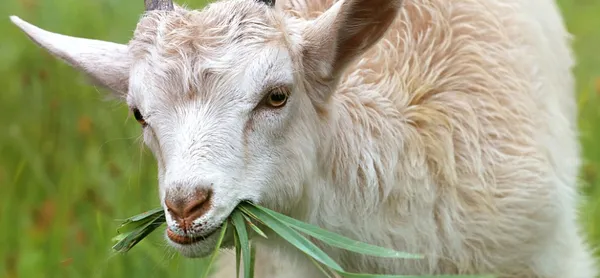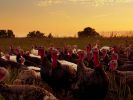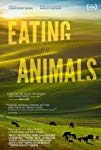Eye For Film >> Movies >> Eating Animals (2017) Film Review
Eating Animals
Reviewed by: Jennie Kermode

Recently, psychiatrists have been reporting that they're seeing more and more patients with forms of depression and anxiety rooted in grief - not of the usual personal sort, but a deep sense of distress at the problems facing species and planet. It appears in part to be a consequence of a culture of despair, and film has played its part in that, with a certain sort of documentary increasingly trying to 'wake up' its viewers by showing them the world at its ugliest. Eating Animals is guilty of this in places but it also does something else. This is a film about animal husbandry and slaughter at its worst - and at its best.
There's no suggestion that the film is not partisan. No effort is made to provide right of reply to those accused of misdeeds, and Natalie Portman's narration is, in keeping with most of her body of work, highly emotive (it's probably no accident that her most acclaimed performance was in Jackie, where she was required to produce something much more restrained). It's unlikely, however, that anyone will be misled by it. There are a few clear-cut (identifiable) errors and some dubious interpretations (for instance, whilst selective breeding is technically a form of genetic engineering, it's a bit dodgy to describe it that way). Most of what is presented is sound stuff, however, and the counterpointing of extremes, whilst it may feel a bit over-dramatic, is an effective tool for demonstrating just how far industrialised food production has gone.

The real challenge for this type of film lies in connecting with audiences beyond those who already believe passionately in what they have to say. Eating Animals, didactic though it can be in places, is not a documentary intended only for consumption by vegetarians. It is, if anything, most relevant to meat eaters, because, on the one hand, it points up some disturbing issues they may want to know about and, on the other, it empowers them to make more ethical choices about where their meat is sourced. There is a little plug at the end for meat-free alternative foods but it's presented as a friendly invitation and the film never comes across as bullying the omnivores in its audience.
The issues presented here go far beyond the question of whether or not it's fair to animals to use them as a food source. There's also a look at the impact of the meat industry on climate change and pollution, and the heavy use (in the US) of antibiotics which enable bacteria to become resistant and threaten human lives. Where the animals themselves are concerned, the focus is on the conditions they're kept in and how they're killed, also taking in the way that some species have been bred to put on so much bulk that they're inherently unhealthy and struggle to move or even breathe. There's no mention of how this depletes the flavour of the meat, possibly because nobody on the production team has personal experience of this, but footage of the animals in question makes quite an impact, as do comparisons with their recent ancestors. As you might expect, some of the footage of industrialised slaughter is particularly unpleasant to watch.
Employing a varied format which incorporates archive material, specially shot footage of factories, farms and labs, and interviews in varied locations, the film remains interesting throughout. It packs a lot into 94 minutes and avoids harping on the same points as many similar documentaries do. Whilst there's nothing here that's really new, the format is effective and viewers who are moved by it will go away knowing that there are choices thy can make that will make a difference - even if they don't want to give up eating animals altogether.
Reviewed on: 02 Jun 2019

















